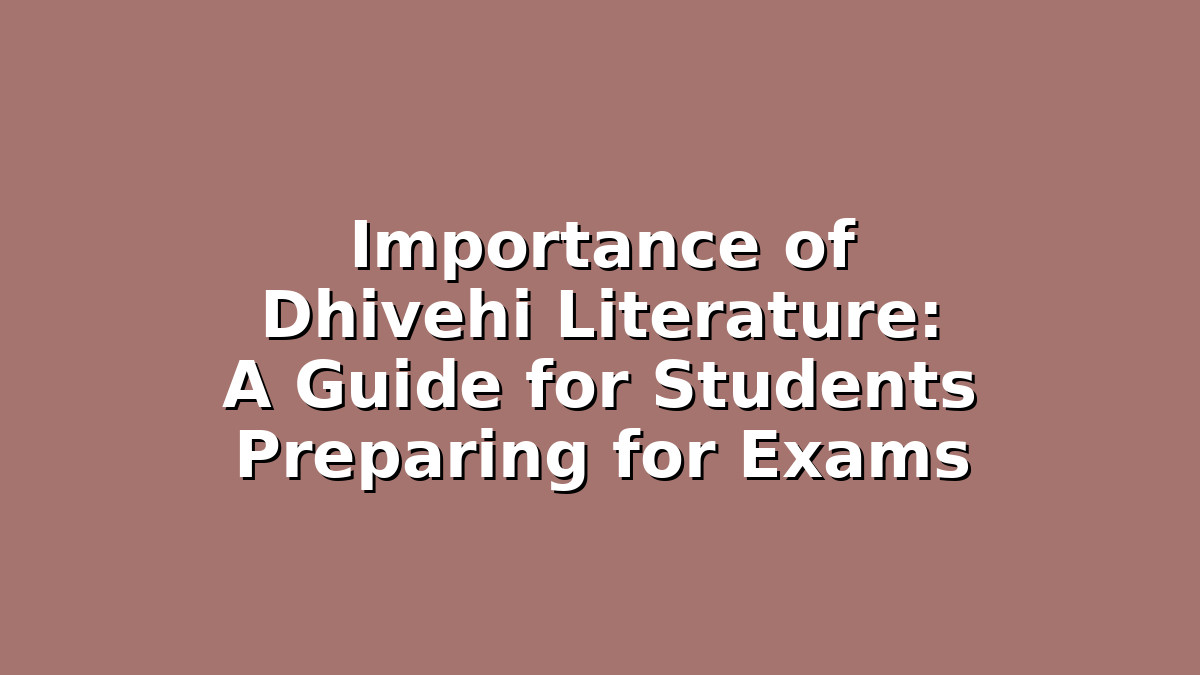Introduction
For students preparing for exams, especially those studying Dhivehi language and literature, understanding the importance of Dhivehi literature is crucial not only for academic success but also for personal growth and cultural appreciation. Dhivehi literature, the rich body of written and oral works in the Maldivian language, reflects the history, values, traditions, and identity of the Maldives. By exploring Dhivehi literature, students can enhance their language skills, develop critical thinking, and gain a deeper connection to their heritage. In this article, we will discuss the significance of Dhivehi literature in three key areas: academic excellence, cultural understanding, and effective study strategies to master this subject for exams.
1. Academic Excellence Through Mastery of Dhivehi Literature
One of the foremost reasons Dhivehi literature holds importance for students is its direct impact on academic performance, particularly for those preparing for language and literature exams. Many exams require a thorough understanding of classic and contemporary Dhivehi texts, poetry, prose, and drama. Excelling in these exams can open doors to further education and career opportunities.
To achieve academic excellence:
– Familiarize Yourself with Key Texts: Start by identifying the syllabus-approved Dhivehi literary works. Make sure to read and annotate these texts carefully. Highlight important themes, characters, and stylistic devices used by authors. This will help you recall details during exams.
– Practice Analytical Skills: Dhivehi literature exams often demand more than just memorization. You need to interpret themes, analyze language use, and discuss the cultural or historical context. Practice writing essays that answer these types of questions. Use past exam papers to get a feel for the format.
– Expand Your Vocabulary: Reading a variety of Dhivehi literary works enhances your vocabulary. When you encounter unfamiliar words, look them up and keep a vocabulary journal. This will not only improve your language skills but also make your writing richer and more expressive.
By preparing systematically and engaging deeply with Dhivehi literature, students can boost their confidence and perform well in exams.
2. Cultural Understanding and Personal Growth Through Dhivehi Literature
Dhivehi literature is more than just an academic subject; it is a gateway to understanding the Maldivian culture and identity. The stories, poems, and plays written in Dhivehi offer insights into the life, beliefs, and values of the Maldivian people across different eras.
For students, immersing themselves in Dhivehi literature can:
– Strengthen Cultural Identity: Reading traditional folktales and historical narratives connects students to their roots, fostering pride and belonging. This connection can motivate you to study the language and literature more passionately.
– Develop Empathy and Perspective: Literature exposes readers to diverse experiences and viewpoints. By engaging with various characters and situations in Dhivehi literature, students can develop empathy and a broader perspective on social issues.
– Enhance Communication Skills: Understanding cultural references and contexts helps you communicate more effectively with peers, teachers, and community members. It also enriches your writing with authentic expressions and ideas.
To deepen your cultural understanding:
– Join literary clubs or discussion groups focused on Dhivehi literature.
– Attend cultural events, storytelling sessions, or poetry readings whenever possible.
– Engage with teachers or family members who can share oral literary traditions and personal insights.
3. Effective Study Strategies for Excelling in Dhivehi Literature Exams
Studying Dhivehi literature requires a combination of reading, analysis, memorization, and writing skills. Here are some study tips tailored for students preparing for exams:
– Create a Study Schedule: Allocate specific times in your daily routine for reading Dhivehi texts and revising notes. Consistency helps retention and reduces last-minute cramming stress.
– Summarize and Paraphrase: After reading a chapter or poem, write a brief summary or paraphrase it in your own words. This reinforces comprehension and prepares you for essay questions.
– Use Mind Maps and Charts: Visual aids can help organize themes, characters, and plotlines. Drawing mind maps makes it easier to recall connections during the exam.
– Practice Past Papers: Attempting previous years’ Dhivehi literature exam questions enhances familiarity with the question format and time management.
– Discuss with Peers: Group study sessions where you discuss themes, interpretations, and difficult passages can deepen understanding and offer new insights.
– Seek Feedback: Show your essay drafts to teachers or mentors and ask for constructive feedback. Improving your writing style and argumentation is key to scoring high marks.
– Memorize Quotations: Important quotes from poems or prose can support your answers and demonstrate a strong grasp of the text. Practice memorizing these in context.
Conclusion
The importance of Dhivehi literature for students goes far beyond passing exams. It is a vital part of preserving the Maldivian language, culture, and identity. By mastering Dhivehi literature, students not only enhance their academic performance but also develop a richer understanding of their heritage and sharpen critical thinking and communication skills. With focused study, cultural engagement, and effective exam strategies, students can confidently approach their Dhivehi literature exams and appreciate the beauty and depth of their native literature. Remember, every page you read and every poem you analyze is a step closer to academic success and personal growth. Keep exploring, stay curious, and let Dhivehi literature inspire you on your learning journey.

Responses